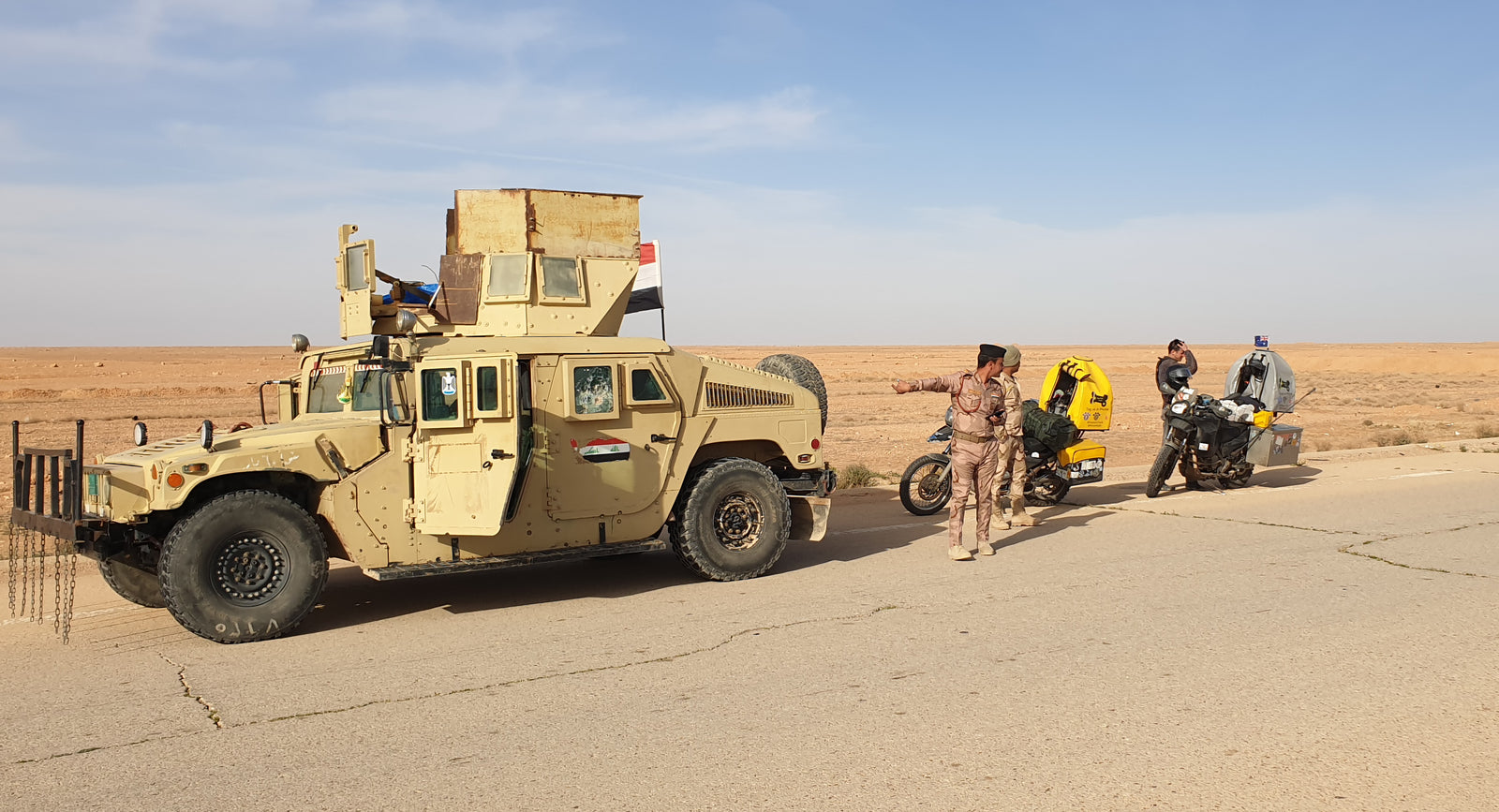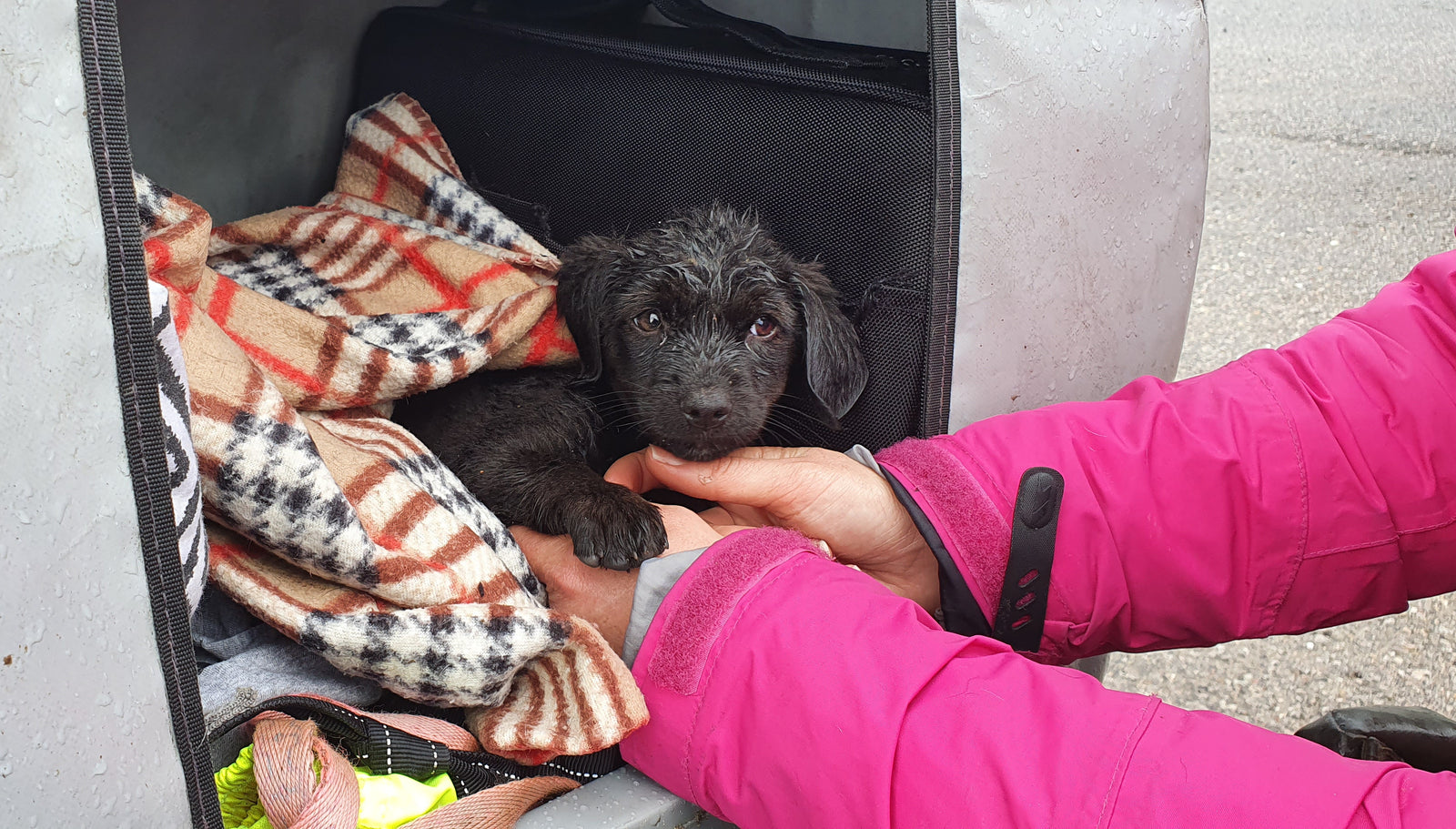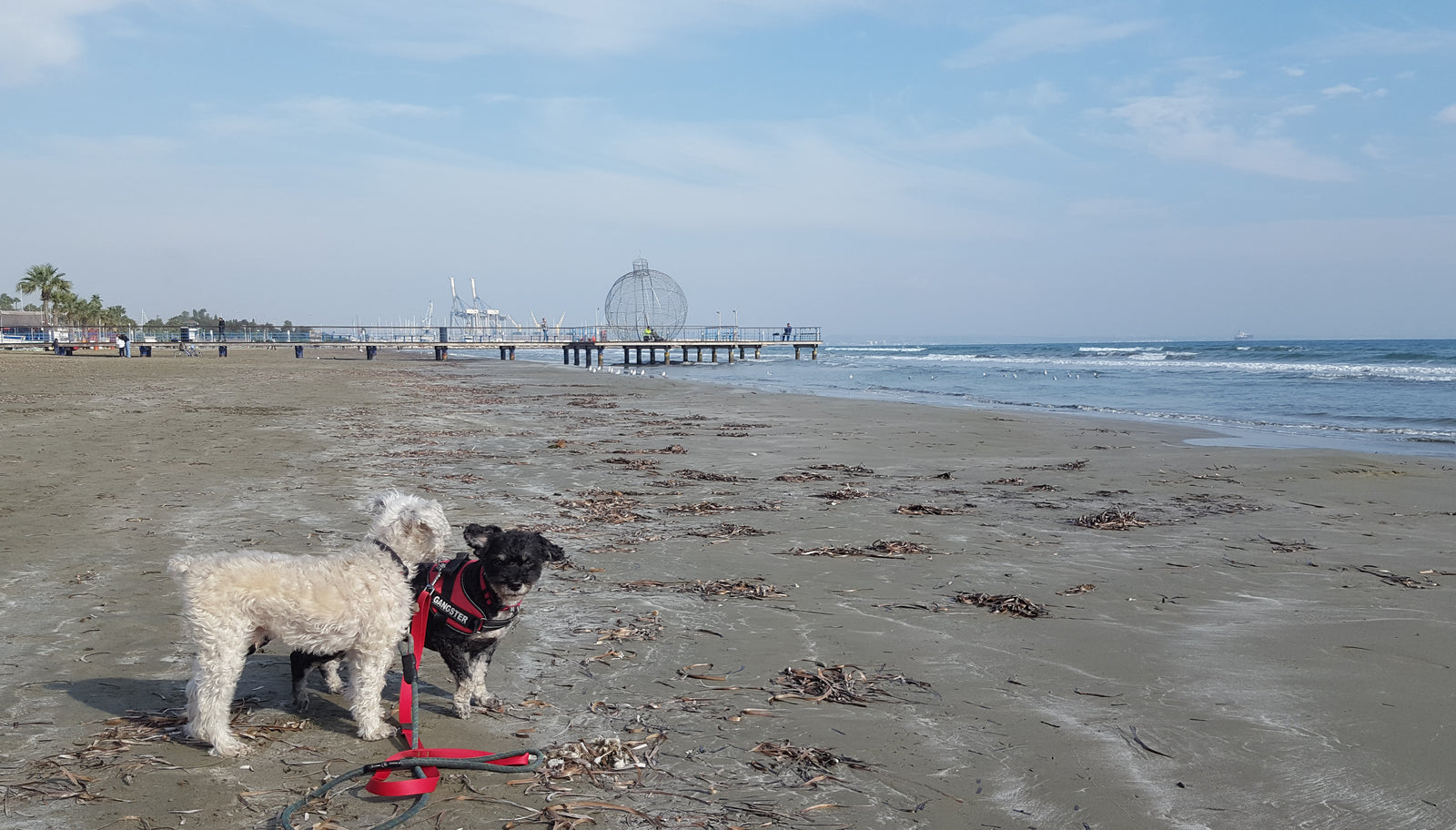Hitchiking with the Angolan Air Force
April 27, 2017
Told in the collective first person, jointly from Stu and Janell Clarke's perspective.
Narrated Audio Blog
Mar and Luis, our new friends we'd made in Pointe Noire, where much more organised than we could ever be. They'd begun their journey with all the visa's they'd need through Africa so while we were often stuck waiting around for a consulate to produce our visa they were able to move on.
After meeting us in the Republic Of the Congo (ROC) they were supposed to head through the Democratic Republic of the Congo (DRC) (yes, very much a different country and neither very democratic). The DRC is fairly lawless, it's not necessarily any more dangerous than its neighbours, but it is more chaotic. The government doesn't have great control over its military or police and so they don't fear retribution for their actions, short of any serious offence that is. So while checkpoints throughout Africa will often ask for a bribe they will quickly move you on from fear of who you might know. But in the DRC this is not so much the case, if an official asks you for money and you don't want to pay then you simply don't get through. They don't see their behaviour as illegal since there isn't much in the way of written law and certainly no legislation they have access to. Rather you are seen as acting illegally for not paying for your passage. We'd heard stories of people being stopped as often as every 10km and being made to pay as much as $20 a time. This made the prospect of crossing the DRC very expensive.
For us the decision had been made a long way back, we'd missed our last chance to get the DRC visa and although we'd asked at consulates in Cameroon, Gabon and the ROC, they all told us the same thing, it was only possible in your home country. This wasn't completely accurate, a handful of consulates will issue a visa but they are few and far between, our last opportunity had been Togo which we'd had to have made a small detour to visit.
But we weren't concerned. We'd read of a number of ways to bypass the DRC. Angola is mostly to the south of the DRC, but there is a small enclave of Angola just to the north, the province of Cabinda. Cabinda is in a similar position to Alaska in the US having an overland route between it and the other provinces but only through another country's territory. The distance from Cabinda to the rest of Angola is less than 50km, but this involves crossing the Congo River and overlanding requires you to travel much further upstream to cross. Alternatives to overlanding included taking a boat from Cabina to either Soyo located just over the river but on mainland Angola or to the capital Luanda nearly 500km further south. However, the option that really interested us was taking a ride on the Angolan Military Transport Aircraft.

The Angolan Air Force, on behalf of the government, operates a daily heavylift transport service between Cabinda and Luanda. This Russian built Ilyushin Il-76 Military Aircraft is used to move military and government assets as well as providing community assistance. However, the service is most noticeably used by the oil companies exploiting Cabinda's offshore oil fields to move container loads of god knows what between Cabinda and the capital. From what we'd read, we could just turn up and ask to be taken to Luanda and they would fit us in, after paying the $150 bribe.
The risk of entering Cabinda was that we only had a 30 day single entry visa for Angola. Using it to enter Cabinda invalidated it for future use and so we couldn't then cross the DRC and re-enter Angola. We had to either commit to entering the DRC and enter Angola for the first time at the mainland or attempt to get from Cabinda to the southern provinces without exiting.
Getting back to Mar and Luis, they had also heard of this service but were unsure. We told them that we too were a little weary but were content that the adhoc ferry service would work as a sufficient backup and so the risk was low. The major difference between us and them was they needed to transport a Toyota Hilux while we just needed to move 2 motorbikes.
Not wanting to venture into the DRC and weighing up all the options Mar and Luis decided that they too would risk their visa and enter at Cabinda. They left the ROC a week before us and it was expected that we would not see them again on these travels as they were on a tight schedule, giving themselves only 12 weeks to drive from Spain to South Africa.
It's difficult to say whether they made the right choice but Cabinda certainly didn't turn into one of their more favourable memories of their Africa adventure. They both fell ill on the first day with a strong fever, but wanting to get to Luanda quickly they packed up and drove to the Air Force base and tried to get on the flight. They failed, not because they were sick but because there wasn't room but it was advised that they should consider getting themselves to hospital.
It turned out their condition was serious and they were in need of hospitalisation. They were diagnosed with Malaria and had become quite sick. They had for sure contracted the illness at least a week earlier and so being in Cabinda in no way influenced this but rather was probably of great benefit. Had they instead ventured into the DRC as planned, they could easily have found themselves in a remote part of an already underdeveloped country where access to medical facilities would have been extremely limited. But instead they found themselves in Cabinda, which rightly or wrongly had world class medical facilities to service the international business community.
Mar and Luis had not long been released from hospital by the time we arrived in Cabinda, but time enough to get back to the Air Force base and enquire into their transport and investigate the ferry options. The options however, looked bleak. The sea conditions had prevented the boat from operating and this was not expected to change in the foreseeable future. This sounded more like an excuse because the seas looked flat. As for the military plane, They were constantly being told that the plane was full and to try again tomorrow.
We had arranged to meet Mar and Luis at the Air Force Base. It was not a long way from Pointe Noire to Cabinda City but it did involve a border crossing. Angola had a black market exchange rate which was worth about 50% more than the official rate. Firstly this meant that we needed to be prepared and bring cash into the country since the ATM's would be paying out at the lower rate and secondly we needed to know where to change money safely while still getting the best rate. We'd done this before in a few countries and at times things had got a little hairy, you generally get the best rate when changing large sums of money but handing over a pile of one hundred dollar notes to someone who is essentially a criminal (the black market being illegal) has its risks. Mar and Luis had already given us a heads up on what rate to accept and where to go to get it, but as is generally the case, the border rate is not the best and so we only changed the bare minimum to get by until reaching Cabinda.
We got to the airport a little later than expected and were actually hoping not to see Mar and Luis as this would have meant they'd got their flight. But this wasn't the case, they were waiting on the side of the road near the entrance. They had already been in that day and told that the plane was full again and to try again the next day. Each day they had been checking out of their hotel assuming they would fly that day and then returning in the afternoon disappointed. This behaviour although frustrating had allowed them to build a relationship with the hotel and when we turned up it was like we'd arrived at a family home.
Mar and Luis told us that the price was now the equivalent of $400 per person and that they would only take payment in Angolan Kwanza, so we'd need to find a cambio (money changer). Mar and Luis knew exactly where to go so after checking into the hotel we all went for a drive. Luis took us to a road where cambio's lined the street, we pulled up next to one and Luis said the rate he wanted, they tried to negotiate but Luis was firm and they conceded. We handed Luis the money to conduct the transaction and all was done before we knew it.
For the next 4 days we packed up early in the morning and rode to the Air Force base only to be told that the plane was full. Our main contact was the Commandant, an interesting title usually reserved for the Commanding Officer of training institutions in English speaking countries but also regularly used for the Commanding Officer of a prison, which we started to feel was appropriate. Although the Commandant was responsible for the airlift, there were higher ranking officials on base, including a General incharge for all operations within Cabinda. We spoke with all of them and were constantly assured that when a spot became available we'd be allowed to travel. It became apparent early on that the issue was the Hilux. We were told that the bikes could travel and every day we were encouraged to do so and leave our friends to take a later flight. For us it was not up for discussion, we'd have more leverage with 4 of us and so we would stick together, we had all the time in the world and could take that option at any time, but for now we'd stick to our guns.
We did the little bit of sightseeing that can be done around Cabinda with the remainder of the days that we did have, but mostly we spent our time at the base waiting until the plane was fully loaded to see if there was a possibility of squeezing us in. Anzac day came and we conducted a short Dawn Service on the balcony of our hotel room. Stu wore his medals for the remainder of the day, hoping to convey a sense of comradery with the senior officers who had undoubtedly also served on UN missions. Unfortunately it didn't sway the situation and we remained isolated in Cabinda.
Mar and Luis were into their eleventh day by the time our fourth day arrived. They seemed upbeat in the morning as they had done every morning but emotion and frustration was simmering away beneath the surface. We entered the base and parked up just outside the airfield where we had waited every other day. We watched as the lined up trucks emptied their load onto the plane either as loose cargo or as a shipping container, it was genuinely impressive how much could fit inside this aircraft. Before long the Commandant came over and told us again that today would not be our day and to try again tomorrow. Mar, starting to seriously believe there was no way for them to get to Luanada, burst into tears. We all tried in vain to console her but Mar had to let it out, it had been building and building and there was no stopping it. Janell noticed a Chinese businessman in the distance and decided to walk over and ask some questions, Mar decided to go along for the walk to help her calm down. As Janell suspected, the businessman had been moving equipment with the Air Force, she told him about the issues we'd had and that we'd started to think that it wasn't possible. Mar was still in tears at this point, he reassured us that space does become available and that perhaps we had just been unlucky. It was reassuring to at least get independent confirmation that the information we'd received was accurate.
We left the airport feeling deflated and hopeless. Mar and Luis had spent nearly 15% of their whole travel time in one little city, they hadn't been this stagnant since they left Spain and their prospects weren't looking good. We headed to a Spanish cafe that we had been frequenting to again look at our options. The owner was a small time businessman who had his fingers in a few pies and we'd hoped would be able to solve our problem, but so far none of his suggestions had resulted in a successful outcome. But at the very least he could always be relied upon to serve up a delicious Tortilla (Spanish Omelette).
We mulled over all the options again, the ferry was still not sailing, shipping by sea was expensive and would take time. Getting another visa for Angola wasn't possible from Cabinda, Mar and Luis would either need another visa for the ROC so they could get the Angola visa from Pointe Noire or drive all the way to Kinshasa, the capital of the DRC where it might be possible to get another Angola visa, but both of these options were risky and meant traveling through the DRC. They even contemplated the idea of finishing their Africa adventure there and then.
Suddenly and very much out of the blue, Luis received a WhatsApp message, it was from the Commandant telling us that the next flight had the four of us, two motorbikes and one Toyota Hilux on the manifest and that we were required at the airport first thing in the morning. This had never happened before, it had always just been a case of turn up and hope for the best. Wow, we were actually on a manifest, this was official. We were super excited and felt we should celebrate. The first night out of hospital Mar and Luis had stayed in a nice hotel with a swimming pool, it was a little out of town but they convinced us it would be worth it, and if we shared one room it would be less than what we were currently paying. For us it was a no brainer, we could do with having access to a pool and sitting in the sun and sharing a room was no issue, it would be like camping with air conditioning.
The next morning we arrived at the airport as instructed. This time however we were quickly directed onto the airfield, this was the closest we'd got. We waited while a container was loaded, it took an agonisingly long time, the anxiety was running high as we still didn't expect to get on board. But eventually we were motioned to move towards the aircraft. First Stu rode up and started strapping his bike in, then Janell followed. This part was somewhat expected to go smoothly, next was the troublesome Hilux. With the bikes secured and the rest of the cargo in place it didn't seem like they'd fit anything else, especially a Hilux. We started to feel like we'd been gypped. But then Mar and Luis were motioned forward. Luis drove up onto the ramp where he was told to stop. Then slowly the ramp door closed, lifting the Hilux up as it did and neatly but fully enclosed within the aircraft fuselage.
As well as the cargo, the plane was carrying people, a lot of people. They occupied any available space, including sitting on our motorbikes. We however, travelled in the comfort of Mar and Luis's Dual Cab Hilux but Stu couldn't resist the opportunity to be standing while the plane landed, an experience no airline would allow.
The flight took around an hour. Once we landed and all the people cleared out we were directed to disembark the vehicles. Luis backed the Hilux onto the tarmac and we unstrapped the bikes and rode off. We were pointed in the direction of the exit gate and made our way off the Air Force base. Neither party particularly wanted to see anything in Luanda and since Mar and Luis were already so far behind schedule it was decided that we would all leave the city and continue heading south immediately. We had also not paid anyone for the transit, we assumed that as we were on the manifest the military staff were not allowed or too afraid to ask for the bribe. In any case, we thought getting as far away from the military base was a good idea.
Not having to pay for the transit was very fortunate, but did leave us with a small delema, we had over $800 worth of Angolan Kwanza. Certainly not a bad problem to have but we'd need to change it back before leaving the country as it would become worthless outside. We'd lose a little in the transaction as we'd not get the rate we did buying but we'd still walk away a winner in the end.
Leave a comment
Comments will be approved before showing up.
Also in Dog Blog

Iraq
March 30, 2022 1 Comment

Turkey & Azra
March 30, 2022

Cyprus
January 12, 2022
Are you a Dog Person?
Do you Love to Ride?
Click below for more information on how you can take your best friend along on your next biking adventure
© 2025 The Pack Track.
Powered by Shopify









